Risk of diarrhea
The tap water at Berlin Airport is contaminated with bacteria – what travelers now need to know
The water in the sanitary facilities in Terminal 1 at BER Airport is currently not allowed to be drunk,
© Patrick Pleul / DPA
Again there is bad news from Berlin: the airport’s tap water is contaminated with coliform bacteria and should not be drunk. What kind of germs are they and how dangerous are they? An overview.
People are used to grief at the new BER airport. It took a long, really long time to build and build and build. Then, after years of delay, it finally opened last October – albeit in the midst of the greatest aviation crisis of all. But that’s not all of the problems. Now the drinking water at BER is also contaminated with germs.
A routine examination found coliform bacteria. Where these come from is so far loud Operating company of the airport not clear. What is clear, however, is that the germs can make you sick. Therefore, the lines are now flushed. It will take several days. During this time, the water in the sanitary facilities in Terminal 1 cannot be used as drinking water. The Federal Police building and the ILA exhibition halls are also affected.
What are coliform bacteria?
Coliform bacteria are better known as Colibacteria, but also as Escherichia coli or E. Coli. They belong to the enterobacteria that mainly occur in the intestines of mammals. Most coli bacteria are harmless to humans, some even help with the digestive process. But some cause problems, they cause infectious diseases.
The intestinal pathogens are transmitted in different ways. “This always involves the unintentional ingestion of traces of faeces,” writes the Robert Koch Institute (RKI). This happens, for example, through contaminated food such as raw meat, raw vegetables and raw milk products.
The bacteria can also be transmitted through a smear infection. For example, if a sick person has not washed their hands properly after using the toilet. According to the Robert Koch Institute, human-to-human transmission is possible as long as the bacteria are excreted in the stool. This can be the case for a few weeks. Another way of transmission is contaminated drinking water.
How do coli bacteria get into drinking water?
Drinking water in Germany is of good quality and can usually be drunk without hesitation. Sometimes, however, there is contamination, and it is not uncommon for coli bacteria to be involved. The water supplier is obliged to provide information about such contamination. The limit is zero.
Since the water supplier guarantees sterility right up to the house connection, the cause of the contamination is usually the installation in the house – such as leaky pipes, dirty filters, boilers. In rare cases, the drinking water of the waterworks is also contaminated, for example if there were operational disruptions.
The water from a drinking water well, as used by some households, can also be contaminated, for example by faeces from humans and animals or by contaminated surface water.
In the case of pollution at the airport, panic does not seem appropriate. “The concentration is low”, quoted the “BZ” the district health department head Stefan Wichary. “We only advise people who are ill from drinking. The airport has done more than it has to.”
How dangerous are coli bacteria?
How dangerous coli bacteria are in individual cases always depends. Whether an individual gets sick does not only depend on the degree of contamination, but also on one’s own immune system. If the germ count is low and the person is healthy, contamination usually does not lead to disease. Without causing symptoms, the germs are excreted again,
If there is severe contamination, the so-called enteropathogenic pathogens, i.e. those that can cause intestinal diseases, can lead to food poisoning, diarrhea, vomiting and traveler’s diarrhea. Others are jointly responsible for diseases such as meningitis, Crohn’s disease and urinary tract infections. Infants, children, immunocompromised people and people with chronic diseases are particularly at risk. With these, even small numbers of germs can lead to disease. Which is why you should only eat food washed.
It also becomes dangerous when E. coli bacteria enter the bloodstream through an open wound. Then they can cause serious infections.

What to do if coli bacteria are in the water?
If contamination is known, the water should not be drunk until the problem has been resolved. Boiling kills the germs. For this, the water should be boiled for at least five minutes.
At BER Airport, travelers are of course not possible, but according to the health department Wichary, they are not necessary either. Nevertheless, travelers can purchase water for 50 cents in the duty-free zone, as can be read on the airport’s Twitter page.
Sources: RKI, Federal Environment Agency




